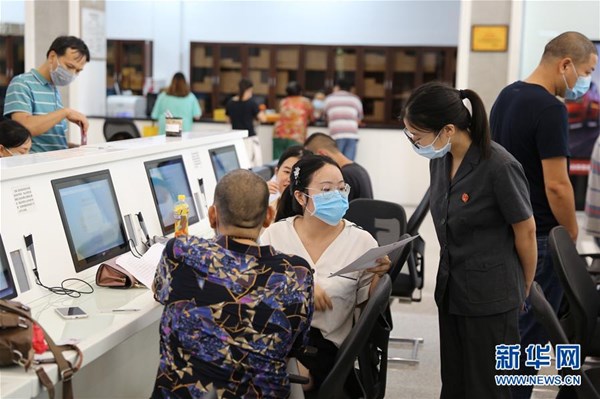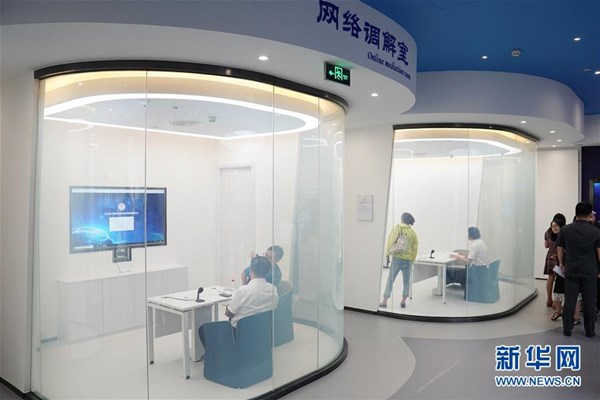Case filing easier at grassroots courts
 |
| Locals use the self-filing system to write statements of claim in Nanhai district people's court, Foshan city, South China's Guangdong province. Cases canbe filed if all materials needed are supplied. [Photo/Xinhua] |
From 2 o'clock on the afternoon, people one after another walked into Nanhai district people's court, located in Foshan city, South China's Guangdong province, lined up to get a number and then found a seat before a computer to write a statement of claim.
Pang, a 53-year-old immigrant worker from Southwest China's Sichuan province, was filing a case at the court. He clicked "filing a case" on a computer screen and wrote his statement carefully. If encountered problems he would turn his head toward a staff member and ask for help.
The self-filing system provides two methods for parties. One is a questions list that automatically generated into a statement of claim when a party completes them; another is a template that a party can just modify in accordance with his or her situation.
Pang chose the latter. "I wouldn't know how to write it at all if there were no template. It's very convenient." After about 20 minutes, his statement was finished and then a message notified him that his case was filed.
Nowadays, litigation service centers of many grassroots courts in the Pearl River Delta where the economy is well developed are equipped with self-filing systems. The parties can have their statement of claim only after simple work on a computer by typing or by voice input.
Since case-filing reform started on May 5, 2015, the number of cases filed in courts in Guangdong has increased year by year which reflects developments in higher levels of litigation services.
"In the past, my colleagues almost always complained that some cases couldn't be filed and couldn't be filed just at one time going to a court," said Feng Zhiliang, a lawyer submitting case-filing materials to Shunde district people’s court in Foshan.
"But now a case can be filed all at once and even if materials requiredare lackingwe are told what should be added. We feel everything is more convenient than before," said Feng.
Over recent years courts nationwide have taken advantage of the development and popularity of the internet to promote the integration of online and offline judicial services. Its 24/7 service particularly allows the public engaged in the struggles against the COVID-19 pandemic to file cases without going outside their doors.
"A party only needs a computer which can connect to the internet, then he or she can file a case. The new technology application makes case-filing as easy as online shopping," said Deng Yijun, president of case-filing division of the Guangzhou Court of the Internet.
The court, founded in 2018, is the third of its kind in China after the Hangzhou and Beijing internet courts, which have been exploring new technologies such as big data, cloud computing and block chain to improve litigation services.
"The operation interface is simple and easy to handle," said Ju Muyun, legal adviser of Guangzhou-based network technology company. The company's rights were infringed during the pandemic and it needed to file a case urgently which in the past could only be done on workdays, but now it can be filed easily on the court's web page and a reply is available in just one week, she said.
As of July 31, the number of cases filed online reached 958,000, a year on year increase of 43.1 percent, and 72 percent of all cases were filed online. Courts in the Pearl River Delta had a rate of over 90 percent for online filing.
The obvious change after reform is not only the more diversified and intellectual types of cases-filing methods but advances in courts' concepts on how to provide better judicial services for people, said Yang Guoqiang, director of the lawyer work committee in Shunde district, Foshan city.
With the increasing number of cases filed after the convenient channel was provided many grassroots courts started to promote diversified dispute resolution mechanism to widen the public's options.
"Our court will connect filed cases and mediation before litigation and develop online mediation so that some disputes can be defused without litigation," said Zhang Hongyue, head of the case-filing division of the Shunde district people's court.
 |
| Online mediation room in the Beijing Internet Court [Photo/Xinhua] |







